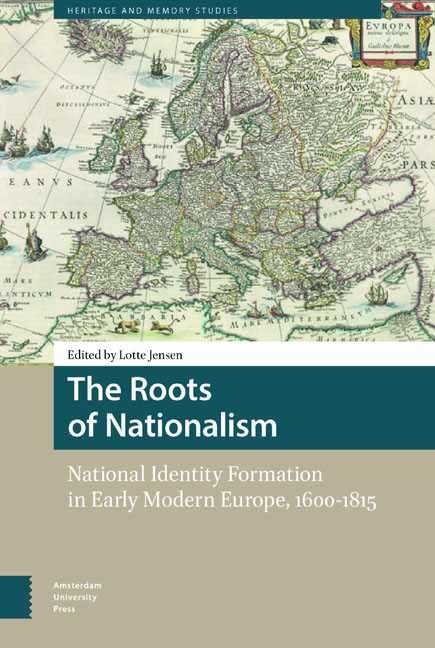Book contents
- Frontmatter
- Contents
- The Roots of Nationalism: Introduction
- Part One The Modernist Paradigm Contested
- Part Two The Genealogy of National Identity
- Part Three Negative Mirror Imaging
- Part Four Maps, Language and Canonisation
- Part Five Nation in the Age of Revolution
- List of Illustrations
- List of Contributors
- Index
14 - Emergent Nationalism in European Maps of the Eighteenth Century
Published online by Cambridge University Press: 03 February 2021
- Frontmatter
- Contents
- The Roots of Nationalism: Introduction
- Part One The Modernist Paradigm Contested
- Part Two The Genealogy of National Identity
- Part Three Negative Mirror Imaging
- Part Four Maps, Language and Canonisation
- Part Five Nation in the Age of Revolution
- List of Illustrations
- List of Contributors
- Index
Summary
There is no single definition of nationalism, but many of them hold it to be an ideology or even doctrine which makes the nation paramount and which implies a national identity based on cultural, linguistic and ethnic lines. The nation is seen to be the most natural and valid collectivity of humans beyond the family, and it should therefore be incorporated when possible in a sovereign political unit, the nation-state. The nation-state supported by cultural nationalism is a phenomenon associated primarily with the nineteenth and twentieth centuries (although of course there were precursors aplenty). The question which will be addressed here is what form nationalism took in the Enlightenment, from about 1650 to 1800, and how it interacted with developments in cartography. Benedict Anderson remarked that modern nationalism grew up only when the old certainties like revealed religion and royal divine right dissolved, towards the end of the eighteenth century. In general, then, in the Enlightenment we are looking not so much at modern populist nationalism, but the popularised, later phases of state formation. The state was being imposed, and the support of the people of the nation was being sought, rather than simply the endorsement of the monarch. And from the seventeenth century onwards, the state frequently employed cartography as a material assistance to state formation. That, in turn, gave considerable opportunity for airing the subject of the nation in cartographic form.
Nationalism in and on Maps
Maps have often been harnessed for nationalist ends at various stages in history. Cartography has been particularly associated with the assertion of national unity at the expense of diversity within, with the declaration of a state's territorial ambitions vis-à-vis another’s, and with the claims of empire. In the words of G.H. Herb, ‘Surveying is an act of national hegemony’, and ‘only maps are able to communicate a precise image of a nation and foster a territorial consensus’. Ricardo Padrón expressed it as follows: the ideological force of cartography ‘ground[s] the authority, even the identity, of nations and empires alike in maps of their territories or their territorial ambitions’.
- Type
- Chapter
- Information
- The Roots of NationalismNational Identity Formation in Early Modern Europe, 1600–1815, pp. 271 - 288Publisher: Amsterdam University PressPrint publication year: 2016
- 1
- Cited by



